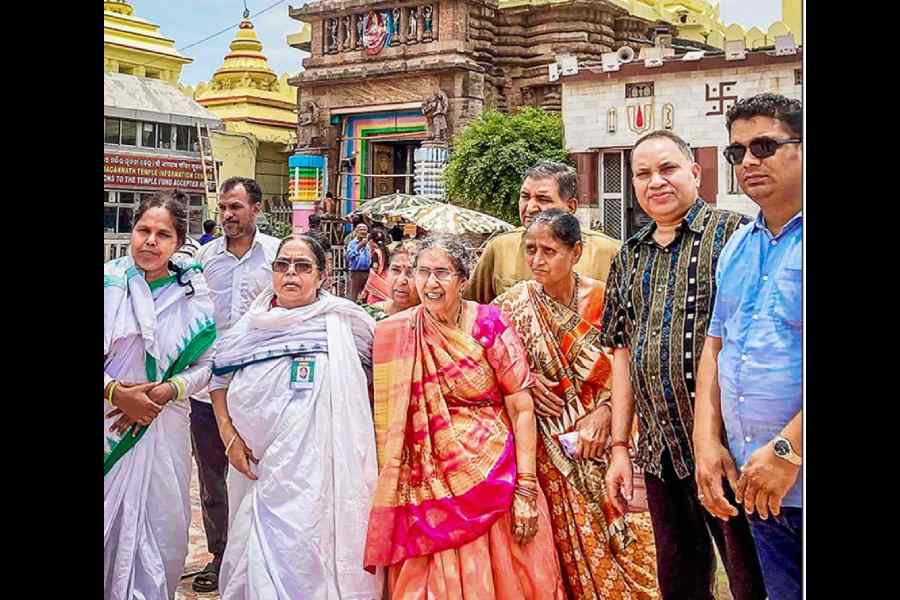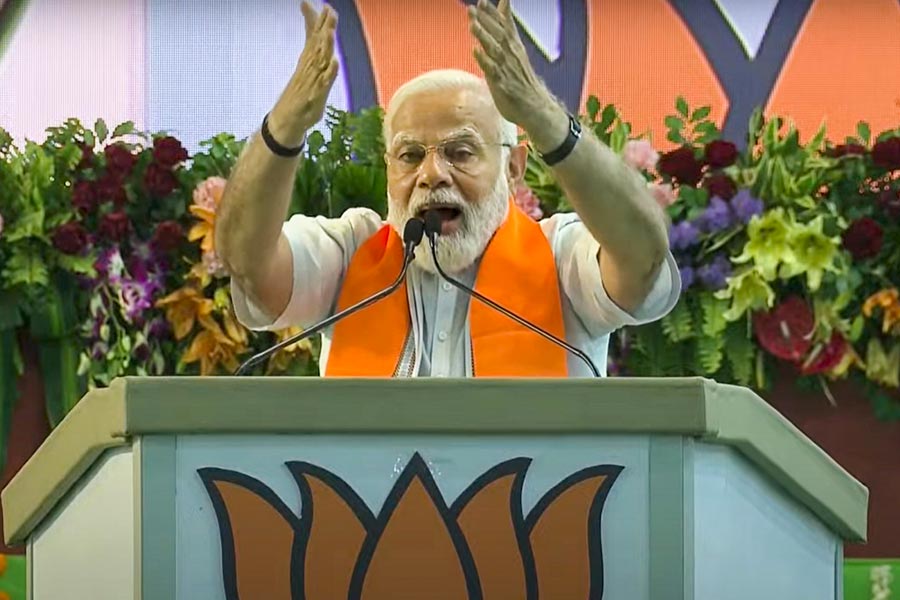Prime Minister Narendra Modi on Tuesday made a strong pitch for auniform civil code (UCC), asking if a country could havetwo sets of rules, and launched an attack on the Opposition’s unity bid, calling them a bunch of corrupt leaders whom he vowed not to spare.
To have a uniform civil code is the third core ideological issue for the BJP after the Ram temple and Article 370, both of which the party has acted on. By referring to the code, Modi appeared to be trying to drag the narrative away from the burning questions raised by the Opposition.
The political pitch, unveiled while addressing party workers at Bhopal in poll-bound Madhya Pradesh, came a day after Modi returned from a six-day visit to the US and Egypt and asked BJP chief J.P. Nadda what was happening in the country.
The dramatic attack on the Opposition’s attempts to come together to take on Modi in 2024, accusing the leaders of being a “guarantee of corruption”, betrayed a sense of concern and uneasiness in the BJP.
The Prime Minister offered a “Modi guarantee” to crack down on all “corrupt” Opposition members. “Agar unki ghotale ki guarantee hai, toh Modi ki bhi ek guarantee hai (If their guarantee is for corruption, then Modi also has a guarantee to offer),” he said, promising “har ghotalebaj par karyawahi ki guarantee” (guarantee of action against each of the corrupt)”.
Civil code
Referring to a uniform civil code, Modi urged Muslims to see how they were being provoked and exploited by the Opposition. He asked why the community continued to lag behind despite the long rule of parties that used them as vote banks.
“Bharat ke Musalman bhai behenon ko bhi ye samajhna hoga ki kaun se rajnaitik dal unhe bhadka karke unka faida lene ke liye unko barbad kar rahe hain. Aaj kal hum dekh rahe hain, uniform civil code ke mamle mein aise logon ko bhadkane ka kaam ho raha hai (Muslim brothers and sisters of India, too, willhave to understand which political parties are inciting them, taking advantage of them and destroying them. These days we can see that on the uniform civil code issue people are being provoked),” Modi said.
The Prime Minister was replying to a question by a BJP worker from Uttar Pradesh who sought his guidance on removing misconceptions being spread about the UCC after instant triple talaq.
“You tell me, can a family run if there is one law for one member and another for the others? Can it ever run? Then how can the country run with two rules?” Modi asked amid loud cries from party workers of “nahi chal payega (It won’t be able to run)”.
Home minister Amit Shah and some other ministers have been batting for a uniform civil code but this is the first time Modi has pitched so strongly for the third polarising issue in the saffron basket. The question by the party worker appeared to have been prepared in advance to give an opportunity to Modi to dwell at length on it. Modi congratulated the worker for asking the question on the UCC.
He stressed that the Constitution also talks about a uniform civil code and pointed out that the Supreme Court had repeatedly spoken in favour of such an arrangement.
“The Supreme Court has repeatedly said, the Supreme Court has called for a uniform civil code. But these vote bank-hungry people…,” Modi said, accusing the Opposition of engaging only in “appeasement” and “vote-bank” politics and not doing anything for the welfare of the minority community. Though he favoured a UCC, stressing a line the government has already taken in an affidavit before the Supreme Court, Modi was silent on whether his government planned to bring a bill in Parliament ahead of the Lok Sabha polls next year.
Sources have indicated that a bill was not on the cards as very little time was left before the elections, but using the issue for political gains was part of the strategy. A bid to divide the Muslims along caste lines seemed apparent with Modi taking up the cause of the “pasmandas (backwards)” among the community. The Prime Minister painted a grim picture of the pasmandas, stressing that they were treated as “untouchables” within their own community.
“The pasmandas are not given equal rights even today. They are seen as lowly and untouchables,” Modi said and urged BJP workers to reach out to them.
In this context, he referred to instant triple talaq, although it has already been banned by his government. He questioned why instant triple talaq would be considered inalienable from Islam if it wasn’t practised in Muslim-majority countries like Egypt, Indonesia, Qatar, Jordan, Syria, Bangladesh and Pakistan. He said that in Egypt, where Sunni Muslims make up 90 per cent of the population, instant triple talaq had been abolished 80-90 years ago.
Opposition unity
The next question was on the Opposition parties’ unity meeting in Patna, asked by a BJP worker from Gujarat. “Seems you are very angry with them (the Opposition parties),” Modi told the party worker. “Don’t be angry, pity them,” he added. But, Modi’s reply appeared to reek of rage.
“People and parties who used to call each other enemies, abuse each other, are now falling at each other’s feet,” Modi said, stressing that it was the result of their “helplessness” and “restlessness” because the BJP was set to return to power. Dubbing the Opposition parties a “guarantee for corruption”, Modi termed the Patna meeting a photo-op and went on to accuse the rival leaders of “ghotala” (corruption) of at least Rs 20 lakh crore.
“And the Congress’s corruption in this total is worth lakhs of crores,” he said, also taking the names of some other parties and mentioning the scams they were allegedly embroiled in.
“Aaj mai bhi ek guarantee dena chhahta hoon. De doon, de doon? (Today, I also want to give one guarantee. Should I, should I?)” Modi said. The party workers replied “yes” and chanted “Modi, Modi”.
“And my guarantee is to act against each of the corrupt, I guarantee to act against each of the thieves and looters. Those who have looted the poor, looted the country, will have to pay for it,” he added, as the workers roared and hailed him. Modi claimed that the Opposition was getting together as the law was cracking down on them and they feared landing in jail. He said the “CMP” (common minimum programme) of the Opposition was to save themselves from action.












